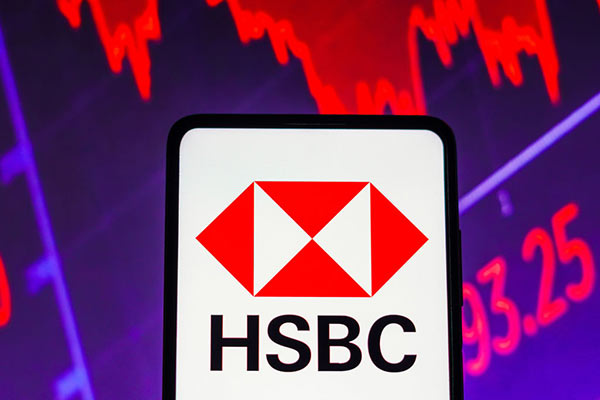ii view: HSBC goes for growth under phase two of its transformation
A new $2 billion share buyback programme and a highly attractive estimated future dividend yield. We assess prospects.
23rd August 2023 12:12
by Keith Bowman from interactive investor

First-half results to 30 June
- Revenue up 50% to $36.9 billion (£29.2 billion)
- Pre-tax profit of $21.7 billion (£17.1 billion), up from $8.8 billion
- Capital cushion or CET1 ratio of 14.7%, up from 14.2% in late December
- Second interim dividend of 10 US cents per share
- New share buyback programme of up to $2 billion
Chief executive Noel Quinn said: “We have delivered a strong first-half performance and are confident of achieving our revised mid-teens return on tangible equity target in 2023 and 2024. There was good broad-based profit generation around the world, higher revenue in our global businesses driven by strong net interest income, and continued tight cost control.
“There is still much work to do, especially given the many challenges in the global economy, but I am confident about the future as we move further into the next phase of our strategy and focus on opportunities to drive value creation, diversify our revenue and retain tight cost control.”
- Invest with ii: Top UK Shares | Share Tips & Ideas | Cashback Offers
ii round-up:
Founded in 1865 in Hong Kong and now headquartered in London, HSBC Holdings (LSE:HSBA) serves around 39 million customers in more than 60 countries and territories worldwide.
It operates across the three arenas of Wealth and Personal Banking, Commercial Banking, and Global Banking and Markets.
For a round-up of these latest results announced on the 1 August, please click here.
ii view:
HSBC employs more than 200,000 people. Its stock market value of around £115 billion stands comfortably ahead of UK-headquartered rivals Lloyds Banking Group (LSE:LLOY), Barclays (LSE:BARC), and NatWest (LSE:NWG), all at under £30 billion. Almost four-fifths of its profit came from Asia during 2022. Its previously detailed transformation plan focuses on reshaping its business portfolio, increasing its capital efficiency, and tightly managing costs. A payout ratio of 50% of earnings excluding significant items is now being pursued for 2023 and 2024 with share buybacks also being considered.
For investors, economic outlook uncertainty, particularly in relation to China, and concerns regarding the health of the property sector cannot be ignored. Heightened tensions between the West and China following the war in Ukraine warrant consideration. As do high levels of industry competition and a price to net asset value comfortably above some rivals, suggesting the shares are not necessarily cheap.
- Stockwatch: a buying opportunity at two UK shares
- Dividend hike at Aviva with positive momentum set to continue
- Stockwatch: one giant leap for FTSE 100 firm
On the upside, having readjusted and simplified its business portfolio under phase one, the second phase of its transformation programme sees it shifting towards value creation and driving growth, and follows the recent launch of its global private banking business in India. Investment in its digital banking services continues, a high focus on costs persists, while the balance sheet looks to remain robust.
For now, and while room for caution exists given Chinese economic uncertainties, an estimated future dividend yield of over 7% should keep income investors at least patient.
Positives:
- Refreshed strategy
- Attractive dividend yield (not guaranteed)
Negatives:
- Uncertain economic outlook
- Heightened political tensions between the US and China
The average rating of stock market analysts:
Buy
These articles are provided for information purposes only. Occasionally, an opinion about whether to buy or sell a specific investment may be provided by third parties. The content is not intended to be a personal recommendation to buy or sell any financial instrument or product, or to adopt any investment strategy as it is not provided based on an assessment of your investing knowledge and experience, your financial situation or your investment objectives. The value of your investments, and the income derived from them, may go down as well as up. You may not get back all the money that you invest. The investments referred to in this article may not be suitable for all investors, and if in doubt, an investor should seek advice from a qualified investment adviser.
Full performance can be found on the company or index summary page on the interactive investor website. Simply click on the company's or index name highlighted in the article.